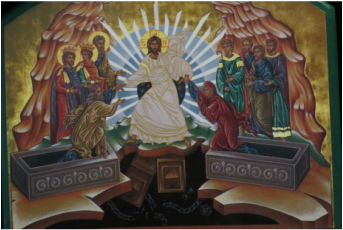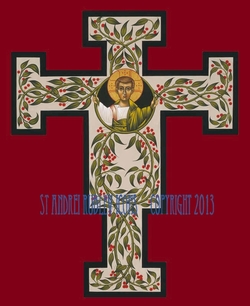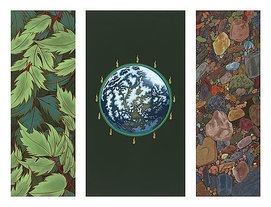 Words don’t always come easily, especially when there are great challenges in the world. But Saturday as I was praying and reflecting on the readings from the Mass of the day, this line reached out unexpectedly, an exquisitely moving verse: “When peaceful stillness compassed everything and the night in its swift course was half spent, your all-powerful word from heaven’s royal throne bounded….” (Wisdom 18:14-15) What a hopeful line of Scripture to read at a time when the world seems like it is in the grip of violence and suffering! It is almost shocking in its beauty to find this verse on this particular day, and yet it is the very truth of the message of God: He is with us and He is in control. It may not seem like it, and it certainly may not feel like it, but God has come into our world and He will come again in glory. The passage from Wisdom, written about fifty years before Jesus came, goes on to indicate that the Messiah would be as a warrior, and it seemed to me that indeed He was, and is, a warrior in the sense that He came to fight the evils of oppression and injustice through the gift of His own life. Paradoxically, Jesus did this by teaching us mercy, compassion, and love. He taught us to find our strength in these things; we are not to simply accept everything that comes along with a sigh of despair. At the end of the liturgical year, as Ordinary Time is waning, it is appropriate to reflect on what the return of Jesus truly means for us as a people and as individuals. And it seems that there is no time like the present, given the state of affairs in our violent world, to reflect upon this very appropriate message.  While there is still a peaceful stillness in this world, it is sometimes overshadowed by certain events or by our attention being rightfully drawn to that which is far less than peaceful. We need not lose sight that there is hope and even goodness in the midst of tragedy and despair. If one reads the entire passage from Wisdom, it refers back to God’s help given to the Israelites in the desert as they escaped quite improbably from the Egyptians who were trying to destroy them after they were released from slavery. This was a bleak situation: desert ahead, wicked tyrant and his soldiers behind, and seemingly nowhere to go because the Red Sea blocked their path. Yet the Lord enabled Moses to lead the people to freedom to save them during a very dire situation.  Jesus did the same when He came: the all-powerful Word leapt from heaven’s royal throne entering into a world darkened by fierce oppression, first from the Greeks for about three hundred years, and then with little pause in between, by the Romans. It seemed like the suffering was unrelenting for this small, faith-filled nation. However, God knew the time at which He would send His Son into the world. In the peaceful stillness of a night chosen by God, He bent low, coming into a turbulent world in order to fight evil and persecution and so to prevail over sin and death. The evil in the world did not go away. In fact, it could appear that Jesus was a failure, since He died on a cross as a criminal even after He did so much for many people. But in the Cross came His death and resurrection. Jesus prevailed over death, opening the gates of Heaven for us. God had promised redemption for His people and He accomplished it. He also said there would be a new Heaven and earth to come. This is the reality for which we await, the New Jerusalem, and this is what we celebrate at this time of year. We believe that Jesus will come again, at a time we do not know, and that when He does, He will conquer all sin for good. In Sunday’s gospel we heard Jesus warn of tribulation to come. However, and this is a big ‘however,’ Jesus tells us not to prognosticate His coming by reading into what we think are signs of the end. “But of that day or hour, no one knows, neither the angels in heaven, nor the Son, but only the Father.” (Mark 13:32) Jesus emphasized this point: if we spend our lives looking at what we think are signs we will be spinning our wheels, so to speak, because only the Father knows the exact hour. While there are terrible things going on now, we cannot get caught in thinking that we know the day and hour of the end of the world as we know it. What we can and should do, however, is be prepared for Jesus’ Second Coming with hope, not with dread. The key is a healthy balance between seeing the reality of the world in which we live and keeping our faith, hope, and love attuned to the truth that God will make good on His promises, something He has always done. But we need to be ready.  When Jesus spoke about tribulation He was not talking about one event or even a series of particular events. Rather, He was referring to the world as it is. There have always been tribulations throughout the course of history, and today no less than at any other time. All of us suffer whether it is at the hands of terrorists or the terrorization of an awful disease, a toxic relationship, or whatever our wounds might be. When Jesus said He is coming in the clouds He was indicating that He will bring about the completion of the Kingdom. But He was also telling us not to get so caught up in the ‘when’ of it that we cease to live the lives we are called to live now. In other words, in living as He taught us, using the gifts God gave us, especially faith, hope, and love, we need to remember that He is already among us, though the work is incomplete at present. But we are not alone, and when the end comes for us personally or at the Second Coming, (whichever comes first) we have nothing to fear.  The end of the liturgical year is a time when we should reflect upon these things. But we always should do so with hope. God is always with us. Even when we falter, God knows the intentions of our heart. He doesn’t expect us to be perfect but to try to do our best at loving. This does not mean we stay silent in the face of injustice. Rather, we unite as a people of faith and take to heart His words about how to love our neighbor and how to love our enemy. (Remember, loving our enemy does not mean acceptance of what they do, thereby becoming silent before them or letting them treat us like ‘doormats.’ It means we act in love, whatever that might mean in a given situation.) We reach out to the suffering, we share what we have, and we put our trust in God who is ever present and who weeps with us as we weep. We remember that we can mourn and have hope simultaneously. That is what Christian faith is really about. Our sorrow helps us to reach out to God for help, and it also helps us to move to action to help others. We work toward unity and solidarity in order to work against evil. And ultimately as we pray for comfort, we also pray for discernment as to what is the loving and just thing to do. We move outward to others because we trust in the message of Jesus, which is that only through love and mercy can we find our strength to move forward rather than to cower in fear. What we learn from these end-of-the-liturgical-year readings is that we must remember that there will always be forces of evil, but that the world also contains goodness and good people. The world is broken and imperfect, awaiting the perfection of the fulfilled Kingdom of Heaven, but it is not devoid of beauty nor is it devoid of the presence of God. As we reflect upon that, maybe with extra poignancy this year, let us cling to the promise of God, knowing that ‘when peaceful stillness compasses everything and the night in its swift course is half spent, the all-powerful Word will come forth from His heavenly throne’ and finish the work He began two thousand years ago. We must cling to this promise. If not, to what can we cling? Who can save us other than God?* And who can be the instruments of bringing His love and mercy into the world if not us? So let us beg God to give us the strength to persevere and then trust that He will.  May we trust in the promises of our God! May we recognize the presence of Jesus in our midst and trust that He will always be with us! May we cling to the faith, hope, and love we have been given at Baptism! May we see the goodness in our world and never lose sight of the ways it is manifest both in natural beauty and through the efforts of our brothers and sisters! May we learn to live in solidarity with others, working toward peace and justice! And may we learn how to await the return of Jesus and the fulfillment of the Kingdom with grace and peace! Let us continue to meet as one in the Heart of Jesus! Peace! ©Michele L. Catanese * Nothing can separate us from the love of God. See Romans 8:28-39. All the photos are mine. The first one is of the moon taken one night from my backyard. The second photo was taken in Big Bend National Park, Texas. Next is an icon of the risen Christ, who is pulling Adam and Eve out of Sheol, releasing the faithful dead into Heaven after the resurrection. The icon was a gift to me from a friend. Next is another one of my photos from Big Bend National Park. Finally are two works by Fr. William Hart McNichols.The first is Christ Emmanuel Flowering Cross. I chose this because I felt like the flowering was a symbol of life which the cross has brought us, which is everlasting life. The Kingdom began with Jesus and so the cross paradoxically brings life. And of course, Christ Emmanuel is 'Christ-with-us.' If you are looking to obtain a copy, or want cards or any other form of this image, it can be found at http://fineartamerica.com/featured/christ-emmanuel-flowering-cross-018-william-hart-mcnichols.html The second is Viriditas Triptych, which is a panel, part of a larger work. You can find it at http://fineartamerica.com/featured/viriditas-triptych-william-hart-mcnichols.html. The complete work, Viriditas-Finding God in All Things is found at http://fineartamerica.com/featured/viriditas-finding-god-in-all-things-william-hart-mcnichols.html
Elise
11/16/2015 11:16:48 am
This came at an opportune moment to discern what is the "just and loving thing to do". Thank youl
Mary Unkel
11/16/2015 11:44:48 am
Thank you Michele. Your writing is always beautiful and meaningful.
Michele Catanese
11/16/2015 11:57:06 am
I appreciate your kindness in support of my writing. It means a lot.
Linda Dalferes
11/17/2015 05:51:47 pm
Most appropriate...esp. the paragraph on tribulation...just finished a study on Job...yes, the world has always had tribulations & suffering. Comments are closed.
|
Heart Speaks to Heart
|

 RSS Feed
RSS Feed

